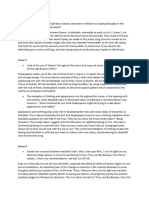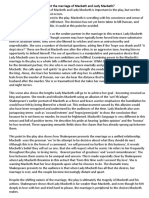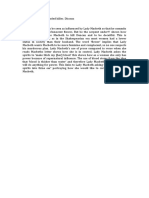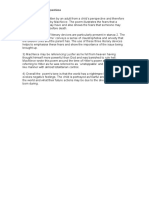0 ratings0% found this document useful (0 votes)
47 viewsMacbeth 1.5-7
Macbeth 1.5-7
Uploaded by
Sam ShohetThis document discusses themes and techniques in Shakespeare's Macbeth. It notes how the play uses dramatic irony to foreshadow Macbeth's betrayal of King Duncan, as well as light and stars as symbols of evil fate. Lady Macbeth is portrayed through her use of prose to reflect her gender and status. The passage also analyzes her belief in prophecies and willingness to gain power through deception and unfair means, as referenced in Macbeth's soliloquy.
Copyright:
© All Rights Reserved
Available Formats
Download as DOCX, PDF, TXT or read online from Scribd
Macbeth 1.5-7
Macbeth 1.5-7
Uploaded by
Sam Shohet0 ratings0% found this document useful (0 votes)
47 views1 pageThis document discusses themes and techniques in Shakespeare's Macbeth. It notes how the play uses dramatic irony to foreshadow Macbeth's betrayal of King Duncan, as well as light and stars as symbols of evil fate. Lady Macbeth is portrayed through her use of prose to reflect her gender and status. The passage also analyzes her belief in prophecies and willingness to gain power through deception and unfair means, as referenced in Macbeth's soliloquy.
Original Title
macbeth 1.5-7
Copyright
© © All Rights Reserved
Available Formats
DOCX, PDF, TXT or read online from Scribd
Share this document
Did you find this document useful?
Is this content inappropriate?
This document discusses themes and techniques in Shakespeare's Macbeth. It notes how the play uses dramatic irony to foreshadow Macbeth's betrayal of King Duncan, as well as light and stars as symbols of evil fate. Lady Macbeth is portrayed through her use of prose to reflect her gender and status. The passage also analyzes her belief in prophecies and willingness to gain power through deception and unfair means, as referenced in Macbeth's soliloquy.
Copyright:
© All Rights Reserved
Available Formats
Download as DOCX, PDF, TXT or read online from Scribd
Download as docx, pdf, or txt
0 ratings0% found this document useful (0 votes)
47 views1 pageMacbeth 1.5-7
Macbeth 1.5-7
Uploaded by
Sam ShohetThis document discusses themes and techniques in Shakespeare's Macbeth. It notes how the play uses dramatic irony to foreshadow Macbeth's betrayal of King Duncan, as well as light and stars as symbols of evil fate. Lady Macbeth is portrayed through her use of prose to reflect her gender and status. The passage also analyzes her belief in prophecies and willingness to gain power through deception and unfair means, as referenced in Macbeth's soliloquy.
Copyright:
© All Rights Reserved
Available Formats
Download as DOCX, PDF, TXT or read online from Scribd
Download as docx, pdf, or txt
You are on page 1of 1
1.
These lines are significance as Shakespeare uses dramatic irony as The
Thane of Cawdor betrayed King Duncan and so will Macbeth.
2. Shakespeare uses light as a euphemism for evil. The relevance of the stars
in the night sky suggests that Macbeth’s fate has been written in the stars.
3. Prose is used as it can represent someone’s station. It was common in
Shakespeare’s time for woman to be less educated and was reflected in
the way they spoke. It is also used as Lady Macbeth is reading a letter
rather than her own words.
4. This shows that Lady Macbeth believes the prophecy and is superstitious.
This helps to highlight her nature it also shows how she is willing to do
anything for power. It also shows how Lady Macbeth will have to force
Macbeth as he is to nice.
5. ‘you wait on natures mischief’ this shows that Macbeth is waiting for
nature to take its coarse not do anything himself and ‘innocent flower,
but be the serpent’ shows how he is going to deceive the people around
him and betray them.
6. This relates to this scene as nothing is ‘fair’ or as it seems. It also relates
to this scene as it shows how you can’t get anywhere without being
unfair.
7. The use of euphemism helps to make Macbeth’s soliloquy more palatable.
The reference to murder as ‘it’ helps to removes Macbeth’s resolve about
the murder.
8. ‘S
You might also like
- Whistle and I'Ll Come To You Is An Extract From Women in Black by Susan HillDocument2 pagesWhistle and I'Ll Come To You Is An Extract From Women in Black by Susan HillSam Shohet100% (2)
- Poem at 39 and Do Not Go Gentle Into That Good Night Parents DeathDocument2 pagesPoem at 39 and Do Not Go Gentle Into That Good Night Parents DeathSam ShohetNo ratings yet
- Night Alice MunroDocument1 pageNight Alice MunroSam ShohetNo ratings yet
- Explore The Relationship Between Macbeth and Banquo in Macbeth.Document4 pagesExplore The Relationship Between Macbeth and Banquo in Macbeth.Sam ShohetNo ratings yet
- Macbeth Act 5 AnnotationsDocument3 pagesMacbeth Act 5 AnnotationsRiddleNo ratings yet
- How Is Lady Macbeth's Dominance Revealed in This Extract?Document2 pagesHow Is Lady Macbeth's Dominance Revealed in This Extract?WitchingDread10No ratings yet
- Macbeth EssayDocument2 pagesMacbeth EssayHannah ReeveNo ratings yet
- Macbeth Questions Act 1 Scene 4-5Document3 pagesMacbeth Questions Act 1 Scene 4-5Ian James Poulin75% (4)
- The Bright Lights of Sarajevo EssayDocument1 pageThe Bright Lights of Sarajevo EssaySam ShohetNo ratings yet
- The Bright Lights of SarajevoDocument4 pagesThe Bright Lights of SarajevoSam ShohetNo ratings yet
- How Has Shakespeare Presented Conflict and Rebellion in The Play So FarDocument2 pagesHow Has Shakespeare Presented Conflict and Rebellion in The Play So FarSam ShohetNo ratings yet
- How Does Miller Present The Relationship Between Eddie and Marco Throughout The PlayDocument3 pagesHow Does Miller Present The Relationship Between Eddie and Marco Throughout The PlaySam ShohetNo ratings yet
- Compare How Childhood Is Presented in Blessings and Half Past TwoDocument1 pageCompare How Childhood Is Presented in Blessings and Half Past TwoSam Shohet100% (1)
- Compare How The Authors of Piano and Poem at Thirty-Nine Convey Childhood?Document2 pagesCompare How The Authors of Piano and Poem at Thirty-Nine Convey Childhood?Sam ShohetNo ratings yet
- Answers For Act 1 For Macbeth Scene 5Document4 pagesAnswers For Act 1 For Macbeth Scene 5ayten.cookiesNo ratings yet
- How Does Shakespeare Present Lady Macbeth in Act 1Document6 pagesHow Does Shakespeare Present Lady Macbeth in Act 1Britt Ashworth60% (10)
- Lady MacbethDocument10 pagesLady MacbethannaNo ratings yet
- How Shakespeare Presents Lady MacbethDocument2 pagesHow Shakespeare Presents Lady MacbethAlishaNo ratings yet
- Gcse Coursework Macbeth EssayDocument6 pagesGcse Coursework Macbeth Essayafiwgjbkp100% (2)
- Macbeth Essay Thesis IdeasDocument6 pagesMacbeth Essay Thesis Ideastcyzgiwff100% (2)
- Macbeth Analysis: OpeningDocument3 pagesMacbeth Analysis: OpeningAlice SmithooNo ratings yet
- Macbeth - Act One Scene 3Document25 pagesMacbeth - Act One Scene 3captainkatyusha717No ratings yet
- What Does This Reveal About Lady Macbeth?Document1 pageWhat Does This Reveal About Lady Macbeth?WitchingDread10No ratings yet
- Macbeth Essay FinalDocument3 pagesMacbeth Essay FinalKrishna BaburajNo ratings yet
- Macbeth Act 1 Questions and AnswersDocument3 pagesMacbeth Act 1 Questions and Answerstfidget382100% (1)
- Macbeth - Knowledge Organiser - A3Document1 pageMacbeth - Knowledge Organiser - A3mahreen sultanaNo ratings yet
- biturajac_mia_ffri_2016_zavrs_sveucDocument43 pagesbiturajac_mia_ffri_2016_zavrs_sveuctaylorpharrell58No ratings yet
- Thesis Statement For Fate in MacbethDocument7 pagesThesis Statement For Fate in MacbethLiz Adams100% (2)
- Lady Macbeth CourseworkDocument6 pagesLady Macbeth Courseworkcharliehoward901No ratings yet
- Act 1 Quotes - MacbethDocument3 pagesAct 1 Quotes - MacbethNathan Nguyen100% (1)
- NtroductionDocument2 pagesNtroductionapi-360153065No ratings yet
- Macbeth Coursework Final DraftDocument2 pagesMacbeth Coursework Final Draftfathima9630No ratings yet
- Context of SceneDocument2 pagesContext of Sceneapi-263814000No ratings yet
- Mac 3. Sample Essay On The Macbeths MarriageDocument1 pageMac 3. Sample Essay On The Macbeths MarriageNoah MartinNo ratings yet
- Macbeth KO A4 SlidesDocument5 pagesMacbeth KO A4 Slidesmahreen sultanaNo ratings yet
- Cómo Escribir Un Ensayo de Macbeth para GcseDocument8 pagesCómo Escribir Un Ensayo de Macbeth para Gcseg69xwche100% (1)
- A Woman Can Be ManlyDocument9 pagesA Woman Can Be ManlyChristy NguyenNo ratings yet
- Macbeth Questions Act 1 Scene 4 5Document4 pagesMacbeth Questions Act 1 Scene 4 5TimNo ratings yet
- Anushka MuduliDocument2 pagesAnushka MuduliAjiteshNo ratings yet
- Macbeth Revision Material For English Lit GCSEDocument8 pagesMacbeth Revision Material For English Lit GCSEbokamosotlholoNo ratings yet
- Macbeth and FeminismDocument3 pagesMacbeth and FeminismEvelinNo ratings yet
- Thesis For Macbeth AmbitionDocument7 pagesThesis For Macbeth Ambitionlisastephensfortcollins100% (2)
- Macbeth (Act 1 Scene 5) - ISC Class 11 Workbook AnsweDocument11 pagesMacbeth (Act 1 Scene 5) - ISC Class 11 Workbook Answe5sy6cntbtnNo ratings yet
- Eng Lit Macbeth Lady Macbeth BESTDocument5 pagesEng Lit Macbeth Lady Macbeth BESTdenslypvdNo ratings yet
- Macbeth Themes QuotesDocument7 pagesMacbeth Themes QuotesRaymondfuNo ratings yet
- Thesis For Lady MacbethDocument7 pagesThesis For Lady Macbethcyndiruppelspringfield100% (2)
- Macbeth, Written by William Shakespeare, Was Written A Year After TheDocument7 pagesMacbeth, Written by William Shakespeare, Was Written A Year After TheArchit GuptaNo ratings yet
- Macbeth Thesis Statement BloodDocument4 pagesMacbeth Thesis Statement Blooddwt29yrp100% (2)
- Macbeth Evil ThesisDocument4 pagesMacbeth Evil Thesisaliyahhkingnewark100% (1)
- Macbeth Analysis - ) GRADE 9Document3 pagesMacbeth Analysis - ) GRADE 9Lizzie ShodiyaNo ratings yet
- Thesis Statements For Macbeth EssayDocument5 pagesThesis Statements For Macbeth Essayallisonweavereugene100% (2)
- Lady Macbeth Thesis StatementDocument6 pagesLady Macbeth Thesis Statementbethhinesanchorage100% (2)
- Term 5 KS4 Knowledge Organiser MacbethDocument2 pagesTerm 5 KS4 Knowledge Organiser MacbethfenertysuzanneNo ratings yet
- Macbeth Thesis Statement GenderDocument5 pagesMacbeth Thesis Statement Genderkarenstocktontulsa100% (1)
- Macbeth Answers - 11Document7 pagesMacbeth Answers - 11TshegoNo ratings yet
- Lady Macbeth (Brief)Document16 pagesLady Macbeth (Brief)kuku12singhNo ratings yet
- Macb Eth: Fair Is Foul and Foul Is Fair...Document29 pagesMacb Eth: Fair Is Foul and Foul Is Fair...Emma LoriNo ratings yet
- Analytical EssayDocument2 pagesAnalytical EssaymiraamerabdallahNo ratings yet
- Macbeth Scene by Scene QuotationsDocument10 pagesMacbeth Scene by Scene Quotationsa15ya100% (1)
- Lady Macbeth (Brief) PDFDocument16 pagesLady Macbeth (Brief) PDFRen NairNo ratings yet
- Thesis For Macbeth As A Tragic HeroDocument4 pagesThesis For Macbeth As A Tragic Herooxylhkxff100% (1)
- MLA Format (San Diego Met)Document1 pageMLA Format (San Diego Met)npsrzrdqmcNo ratings yet
- Macbeth Thesis AmbitionDocument7 pagesMacbeth Thesis Ambitionlisawilliamsnewhaven100% (1)
- ILP Lady Macbeth. SubmissionDocument7 pagesILP Lady Macbeth. Submissionalondra.rendongueNo ratings yet
- Learning Evaluation TLA 1:: Using Prior Knowledge and Contextual CluesDocument10 pagesLearning Evaluation TLA 1:: Using Prior Knowledge and Contextual CluesKristine Dahang MabalosNo ratings yet
- RESOURCE The Misery of Macbeth' PowerPointDocument41 pagesRESOURCE The Misery of Macbeth' PowerPointice.cream.is.yummy35No ratings yet
- Macbeth ExerciseDocument3 pagesMacbeth Exercisesur40470No ratings yet
- Copy of the Tragedy of Macbeth Act 1 Guiding QuestionsDocument2 pagesCopy of the Tragedy of Macbeth Act 1 Guiding Questions2027campbell.lelandNo ratings yet
- Macbeth Good Vs Evil ThesisDocument6 pagesMacbeth Good Vs Evil Thesissharonrobertseverett100% (2)
- What's It All About, Shakespeare? A Guide to Macbeth: What's It All About, Shakespeare?, #2From EverandWhat's It All About, Shakespeare? A Guide to Macbeth: What's It All About, Shakespeare?, #2No ratings yet
- Unwelcome Neighbors and Chinese CinderellaDocument2 pagesUnwelcome Neighbors and Chinese CinderellaSam ShohetNo ratings yet
- The Language in The Last Two Lines Is MysticalDocument1 pageThe Language in The Last Two Lines Is MysticalSam ShohetNo ratings yet
- How Successfully Does The Writer Compare The Idea of Sport and War in DisabledDocument1 pageHow Successfully Does The Writer Compare The Idea of Sport and War in DisabledSam Shohet33% (3)
- You May Write Me Down in HistoryDocument2 pagesYou May Write Me Down in HistoryMude Kishore NaikNo ratings yet
- Macbeth Is A Cold-Blooded Killer. DiscussDocument2 pagesMacbeth Is A Cold-Blooded Killer. DiscussSam ShohetNo ratings yet
- How Does The Writer Present The Meeting With The Unknown GirlDocument1 pageHow Does The Writer Present The Meeting With The Unknown GirlSam ShohetNo ratings yet
- Anthology B Short Stories: Significant Cigarettes: Rose TremainDocument14 pagesAnthology B Short Stories: Significant Cigarettes: Rose TremainSam Shohet100% (1)
- Macbeth Is A Cold Blooded Killer 2.0Document1 pageMacbeth Is A Cold Blooded Killer 2.0Sam ShohetNo ratings yet
- Prayer Before Birth Q'sDocument1 pagePrayer Before Birth Q'sSam ShohetNo ratings yet
- How Does The Writer of Night Show The Varied Mental States of The NarratorDocument1 pageHow Does The Writer of Night Show The Varied Mental States of The NarratorSam Shohet0% (1)
- Significant Ciggarettes Is An Extract From A Book Called The Road Home by Rose TremainDocument1 pageSignificant Ciggarettes Is An Extract From A Book Called The Road Home by Rose TremainSam Shohet100% (2)
- Berlin Wall TestDocument1 pageBerlin Wall TestSam ShohetNo ratings yet
- Explore The Significance of Different Kinds of Law in The Play. AVFTBDocument2 pagesExplore The Significance of Different Kinds of Law in The Play. AVFTBSam ShohetNo ratings yet
- Babble FishDocument1 pageBabble FishSam ShohetNo ratings yet
- Compare How The Authors Portray Betrayal in My Last Duchess and La Belle Dame Sans MerciDocument2 pagesCompare How The Authors Portray Betrayal in My Last Duchess and La Belle Dame Sans MerciSam ShohetNo ratings yet
- Unwelcome NeighboursDocument1 pageUnwelcome NeighboursSam ShohetNo ratings yet





















































































